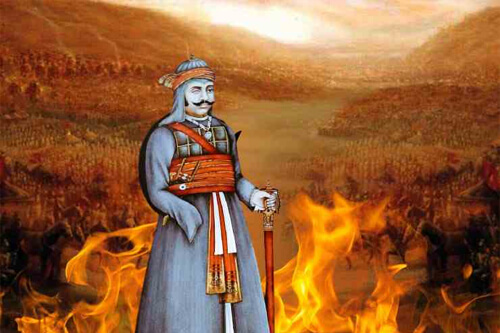RANA SANGA

Rana Sanga, also known as Maharana Sangram Singh, was a prominent Rajput ruler and warrior who played a significant role in the medieval history of India. He was the ruler of the Mewar region, part of present-day Rajasthan, and his reign marked a period of both territorial expansion and conflicts.
Key points about Rana Sanga:
Birth and Lineage:
Rana Sanga was born in 1482 in Mewar, the son of Rana Raimal. He belonged to the Sisodia Rajput dynasty, which had a long and illustrious history in the region.
Ascension to the Throne:
Rana Sanga became the ruler of Mewar after the death of his father in 1509. His reign saw a renewed focus on expanding the territories of Mewar.
Military Campaigns:
Rana Sanga was known for his military prowess and led several campaigns to expand his kingdom. He sought to unite various Rajput clans against the external threat posed by the Delhi Sultanate and other regional powers.
Battle of Khanwa (1527):
One of the most significant events in Rana Sanga's life was the Battle of Khanwa fought against Babur, the founder of the Mughal Empire, in 1527. Despite putting up a strong fight, Rana Sanga was defeated, and the Mughals gained control over a significant portion of North India.
Alliance with Babur's Opponents:
Rana Sanga formed alliances with other rulers, including the Afghan chief Ibrahim Lodhi and the Rajput chiefs of Marwar and Mewat, to resist the expanding influence of the Mughals.
Death:
Rana Sanga died in 1528. The exact circumstances of his death are debated, with some sources suggesting he succumbed to injuries sustained in the Battle of Khanwa, while others claim he was poisoned.
Legacy:
Rana Sanga is remembered as a valiant and patriotic ruler who resisted foreign invasions. Despite his defeat at Khanwa, he left a lasting impact on Rajput history and is celebrated for his efforts to preserve the independence of Mewar.
Rana Sanga's Successors:
After Rana Sanga's death, his son Rana Ratan Singh succeeded him as the ruler of Mewar. The legacy of the Sisodia Rajputs continued, with subsequent rulers facing various challenges from external powers.
Rana Sanga's role in the Battle of Khanwa and his efforts to unite Rajput clans against external threats have made him a revered figure in Rajput history, symbolizing resistance and valor.
